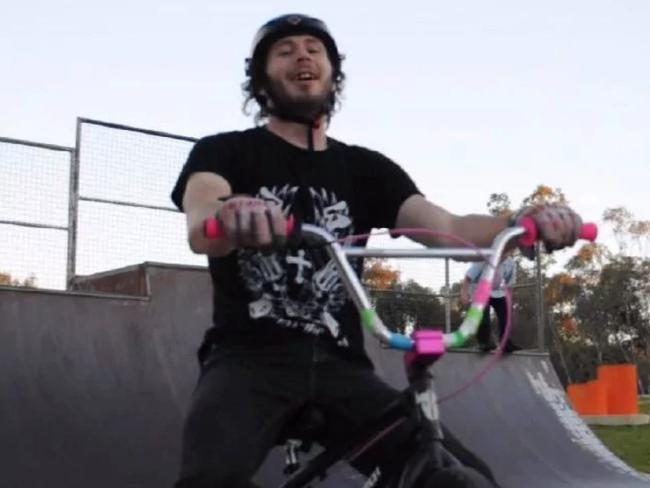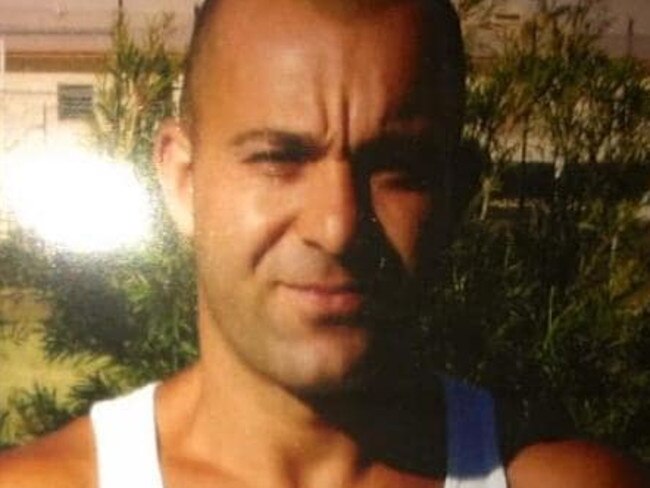Victorian criminals hit with extra time as soft sentences thrown out
JUDGES are having their lenient sentences thrown out as prosecutors increasingly succeed in appeals for tougher jail terms — including having one sex monster’s prison stint increased by 10 years.
Law & Order
Don't miss out on the headlines from Law & Order. Followed categories will be added to My News.
EXCLUSIVE: JUDGES are having their lenient sentences thrown out as prosecutors increasingly succeed in appeals for tougher jail terms — including having one sex monster’s prison stint increased by 10 years.
A Herald Sun investigation can reveal the Crown has been successful in appeals against lenient sentences in half of cases it dragged back to court over the past two years.
Bikies, terror plotters, killers, big time drug dealers, child-sex monsters and other violent criminals are among those to cop tougher punishments.
DUEL BETWEEN TOP VICTORIAN JUDGE AND PROSECUTORS
HIGH COURT RULINGS EXPOSE VICTORIA’S SENTENCING MESS
CORRECTIONS STAFF TO PATROL YOUTH PRISONS
Data compiled for the Herald Sun reveals that of 16 appeal cases between July and December last year, 11 saw higher sentences dished out.
In the past financial year, prosecutors appealed 28 cases, winning 16.
Court of Appeal judges scolded their fellow judges for some sentencing decisions. In a case where a 51-year-old man was so viciously attacked he lost part of his bowel, the appeal court increased the original 23-month jail term to five years.
The judgment said there was “nothing in His Honour’s sentencing remarks which adequately explains such a lenient sentence”.
Supreme Court Chief Justice Anne Ferguson said “sentencing isn’t straightforward”.
She added that punishment, deterrence, rehabilitation and protecting the community were key issues to take into consideration.


Chief Justice Ferguson said: “All judges strive to ensure the fairest and most appropriate sentence for any crime.
“When a decision is made and someone is unhappy about it, the decision can be taken to an independent group of people (the Court of Appeal) to look at it and change the decision if they agree it was wrong.
“The ability to remake the decision if there’s been a mistake is what makes the decision-making by judges very different from most jobs.”
The Chief Justice said: “In the last financial year there were over 1700 sentences imposed. What the Court of Appeal statistics show is that there are very few appeals and of those, only a small number are successful.”
In another example, the Court of Appeal was also critical of a 10-year jail term given to Sevdet Besim, who plotted to run down and behead a policeman on Anzac Day, arguing the sentence did not meet community standards.
“Having regard to the scourge of modern terrorism, and the development of more recent sentencing principles in this area, this seems to us to have been unduly lenient,” the judges said.

In one of the worst cases uncovered, well-known BMX rider and online predator Fabien Meharry abused 22 girls between the ages of 11 and 17, subjecting them to degrading acts over nine years. He got just 12 years in jail.
After an appeal was lodged, the Court of Appeal increased that sentence to 22 years.
Jared Brown, who helped a Mexican syndicate import ice worth $60 million, was originally jailed for 12 years but later had that increased to 20 years, with a non-parole period of 15 years.
Legal sources say prosecutors are becoming increasingly frustrated at many sentences dished out, but current sentencing practices dissuade them from appealing as new precedents with tougher punishments were not being set.
Victims of Crime Commissioner Greg Davies said judges needed to harden up and start giving more weight to the maximum sentence rather than just a paltry portion of it.
“Judges need to start listening to the community and the High Court to deliver a modern justice system that the community wants,” Mr Davies said. “It should not be left to the appeals court to rectify a sentence that is so bad, it is almost doubled.
“The only guarantee that the community will feel safe from these predatory criminals is while they are incarcerated.”
The Office of Public Prosecutions declined to comment.
It was recently revealed Supreme Court judges had snubbed the state government’s Sentencing Guidelines Council, which aims to give Victorians a greater say on the sentencing of serious criminals, declaring it was inappropriate for them to take part.
JUDGES SLAPPED DOWN
JAMES WEBBER
CRIME: Intentionally causing serious injury
SENTENCE: 23 months jail and 18-month community correction order
APPEAL: Five years with non-parole period of three years.
DIFFERENCE: An extra three years
Webber viscously attacked a 51-year-old man sitting on his front steps taking a break from gardening. Without the slightest provocation, he was pinned to the ground, punched to the head with both fists, kicked to the body. Attack only stopped when offender’s partner intervened. Victim admitted to intensive care, lost a section of his bowel and suffered internal bleeding.
COURT OF APPEAL: “There is nothing in his Honour’s sentencing remarks which adequately explains why such a lenient sentence was imposed. This was … a wholly unprovoked, cowardly and brutal attack by an offender who had prior convictions.”
SEVDET BESIM
CRIME: Having done acts in preparation for, or planning, a terrorists act.
SENTENCE: 10 years jail with non-parole period of seven years and six months.
APPEAL: 14 years jail with non-parole period of 10 years and six months.
DIFFERENCE: An extra four years

Sevdet plotted to run down and behead a policeman on Anzac Day and take his gun.
COURT OF APPEAL: “Having regard to the scourge of modern terrorism, and the development of more recent sentencing principles in this area, they seem to us to have been unduly lenient. The sentence did not accord with community expectations.”
CLINT RIVETTE
CRIME: 1x burglary, 2x theft, 1x reckless conduct endangering life, 1x unlicensed driving, 1x possessing a controlled weapon.
SENTENCE: 715 days jail and 2-year community corrections order
APPEAL: Five years and nine months jail with non-parole period of four years.
DIFFERENCE: An extra three years and eight months

Holding a stolen television, Clint Rivette and cousin Emily, stole an idling car. Just as they were about to drive away, the car’s owner threw himself onto the bonnet was forced to hang on for 30 minutes as the crook drove at high speeds and tried to fling him off by swerving and braking. He was jailed in 2010 after stealing a car with three children inside at Northland shopping centre, driving at speeds of 75km/h before letting the siblings out.
COURT OF APPEAL: “His Honour was obviously motivated by a deep desire to ensure that the respondent had the best chance, albeit slim, for rehabilitation. But the length of the sentence of imprisonment which his Honour considered to be appropriate for the offending … was, in our opinion, grossly inadequate.”
JARED BROWN
CRIME: Importation of commercial quantity of methamphetamine.
SENTENCE: 12 years jail with non-parole period of seven years
APPEAL: 20 years jail and non-parole period of 15 years
DIFFERENCE: An extra eight years
Jared Brown blamed Mexicans for coercing him in helping them import almost 50kg of pure ice — street value of $60 million — with the drugs concealed in car engines.
COURT OF APPEAL: “Brown was not motivated by addiction or financial distress. He seems to have been motivated solely by greed. He played a very important role at the Australia end of the importations.
FABIAN MEHARRY
CRIME: 67 charges including producing child pornography, sexual penetration of a child under 16 and grooming children using a carriage service.
SENTENCE: 12 years jail with a non-parole period of 10 years
APPEAL: 22 years jail with a non-parole period of 18 years.
DIFFERENCE: An extra 10 years

Over a nine-year period, BMX rider Fabian Meharry abused 22 girls between the ages of 11 and 17 after befriending them on social media. The online predator would then ask to send him sexual photos of themselves and blackmail into performing degrading sexual acts online while secretly recording it.
COURT OF APPEAL: “There are many disturbing and some uniquely horrifying features of the respondent’s offending which elevated its seriousness. There was a callous disregard for the dignity and wellbeing of his victims. General deterrence was also important because the ease with which offences of this kind are committed using the internet made it imperative that those who might be inclined to act in this way should be made aware that, if detected, they will face very lengthy terms of imprisonment.”
CHRISTOPHER IAN DAVIS
CRIME: 4 x rape
SENTENCE: Eightmonths jail and three-year community corrections order
APPEAL: Four years and six months jail with a non-parole period of three years and three months.
DIFFERENCE: An extra three years and eight months
Christopher Davis raped a woman who was sleeping in swag, He later told the victim he thought she was someone else, her friend, and that he was sorry and she should not say anything.
COURT OF APPEAL: “Christopher Davis remained to large degree an appropriate vehicle for general deterrence in respect of offending of this kind. The sentence which her Honour imposed was not commensurate with the gravity of the offending.”
ALEXANDER JOHN SEMAAN
CRIME: Murder
SENTENCE: 22 years jail with a non-parole period of 18 years
APPEAL: 28 years jail with a non-parole period of 24 years jail.
DIFFERENCE: An extra six years

Sitting in his bungalow at the back of his mum’s house with a gun in his lap and an ice pipe in his hand, Alexander Semaan told a relative: “I want to kill everybody. Everybody”.
Soon after, he shot his mate Michael Bekhazi in the back of the head. During his trial he argued an unknown intruder murdered his friend. Semaan was on parole at the time of the ice fuelled murder.
COURT OF APPEAL: “The killing was cold-blooded. It was perpetrated on a man who had offered no provocation, and was perpetrated by a man on parole who possessed an appalling criminal history. The sentence passed on the applicant might have been barely adequate had the applicant pleaded guilty and shown remorse.”
STEVEN AFFORD
CRIME: Importation of commercial quantity of heroin
SENTENCE: Three years and two month jail with a minimum of two years.
APPEAL: 10 years jail with a minimum of seven years.
DIFFERENCE: An extra six years and eight months
Afford believed God was going to make him rich and he claimed he was an unwitting drug mule. An international drug syndicate lured him by offering him a $500 million hotel construction contract. He was busted with 2.4kg of heroin on a flight back to Melbourne, from Manila, after being told cash funds in Australia for the project had been defaced and needed “cleaning” with “separation oil”.
COURT OF APPEAL: “It is overwhelming that the aggregate sentence dealt inadequately with the respondent’s offending. The resulting aggregate sentence imposed was so inadequate as to show error in point of principal.”
DENNIS BASIC
CRIME: Firearm charges, making an explosive substance with intent to enable another person to endanger life or to cause serious injury, knowingly possess explosive substances, drug possession, breaching a CCO for the 2013 firearms offending
SENTENCE: Two years and four months jail with a non-parole period of one year and six months.
APPEAL: Five years and six months jail with a non-parole period of three years and eight months.
DIFFERENCE: An extra three years and one month

Former Hells Angel member Dennis Basic supplied petrol for two improvised explosive devices to attack Nitro Gym in Hallam owned by the Victorian president of the Comanchero motorcycle club. At the cabin where he lived and in his ute police found loaded guns including a semiautomatic rifle, revolvers, handguns, shotguns and balaclavas.
COURT OF APPEAL: “Neither the head sentence nor the cumulative sentences of
imprisonment imposed with respect to the three further firearms offences adequately reflected the gravity of the offending, the obvious need for specific and general deterrence, denunciation, punishment and protection of the community.”
